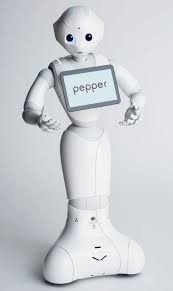Pepper
SoftBank RoboticsService
Available
Overall Score62/100
$32,000 (Discontinued)
World's first emotion-reading humanoid robot designed for customer service and human interaction. Over 27,000 units deployed globally.
Height:1.2m
Weight:28kg
Released:2014
Last Tested:2021-06-01

Demo Video
Pepper Performance Profile
Robot
Human Baseline
34
Mobility
(20%)
15
Explosive
(10%)
85
Stability
(15%)
30
Dexterity
(20%)
78
Perception
(15%)
88
Language
(10%)
73
Safety
(5%)
70
Energy
(5%)
70
Generalization
(5%)
75
Maintenance
(5%)
Specifications
Height1.2m
Weight28kg
Degrees of Freedom19
Actuator Type20× DC Motors
Power SourceLi-ion 30Ah/795Wh
Operating Time12 hours
Sensors2× HD cameras, 4× microphones, touch sensors
ComputingIntel Atom E3845 + 10.1" tablet
Key Features
Emotion recognition engine
20+ language support
10.1-inch chest tablet interface
12-hour battery life
Omnidirectional wheel movement
Test Info
Last Tested
2021-06-01
Test Location
Various retail and service locations
Certifications
Consumer Safety StandardsCE Marking
Detailed Test Results
10-Dimensional EvaluationWalking Speed
45/ 100m/s
3 km/h wheeled movement
Performance vs Human Baseline45%
Test Method: Indoor navigation test
Endurance
90/ 100hours
12-hour battery life
Performance vs Human Baseline90%
Test Method: Continuous operation test
Agility
40/ 100score
Limited to flat surfaces
Performance vs Human Baseline40%
Test Method: Maneuverability test
Category Average:34/100
Weight:20%
Human Baseline:100/100
10-Dimensional Test Protocol
All tests conducted according to the comprehensive humanoid robot evaluation standards with human performance as baseline (100%). The new system evaluates: Mobility (20%), Dexterity (20%), Stability (15%), Perception (15%), Explosive Power (10%), Language (10%), and four supporting dimensions (5% each).
Advantages
Pioneering emotion recognition technology
Excellent battery life (12 hours)
Multi-language support (20+ languages)
Proven in real-world deployments
Natural human-robot interaction
Limitations
Discontinued in 2021
Limited mobility (wheels only)
No physical manipulation capability
Restricted to flat indoor environments
High cost for limited functionality